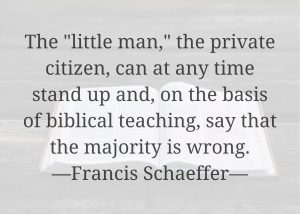It is when a people forget God that tyrants forge their chains.
—Patrick Henry—
The “little man,” the private citizen, can at any time stand up and, on the basis of biblical teaching, say that the majority is wrong.
—Francis A. Schaeffer—
Key point: Perhaps the most effective weapon against tyranny is the biblical concept of absolute truth and the willingness of those who believe in it to uphold it and not depart from it.
Access all the articles in this series, as well as articles in a related series, here. A Bible study titled “Could Jesus Have Been a Good Teacher Without Being God?” is available here.
As we discussed last time, a recently published article at disrn.com offered a preview of results from a recent survey of evangelicals (the complete findings of which are now available here.) The title itself is alarming: “One-third of evangelicals believe Jesus was a ‘good teacher,’ but ‘not God.'”
Why is this alarming? Because if Jesus was a good teacher, what He taught was true; and if what He taught was true, then He is God, for He taught that He is indeed God. Since He taught this, if He was wrong about this, He wasn’t a good teacher at all, but either a liar or hopelessly deceived. An individual who’s wrong about who Jesus is is wrong about the most important question in life.
An individual who’s wrong about who Jesus is is wrong about the most important question in life.
Along with last week’s article, I released a new Bible study that explores the identity of Jesus in depth. Christians, church leaders, and churches are invited to use this material to help believers understand the issue from a biblical perspective. Interestingly, Jesus’ identity as God relates directly to the critical matter of absolute truth.
Relativism Stands in Opposition to Biblical Truth, Including the Truth About Who Jesus Is
Relativism is very much “the thing” among Americans today, including, as we will soon see, many who claim to be Christians. “Sure, you can make up your own truth and live by it!” Yet the individual who says this will be the first to cry “Unfair!” if his wallet is stolen or if someone snatches her purse. C. S. Lewis put it this way.
 Whenever you find a man who says he does not believe in a real Right and Wrong, you will find the same man going back on this a moment later. He may break his promise to you, but if you try breaking one to him he will be complaining “It’s not fair” before you can say Jack Robinson. A nation may say treaties do not matter, but then, next minute, they spoil their case by saying that the particular treaty they want to break was an unfair one. But if treaties do not matter, and if there is no such thing as Right and Wrong—in other words, if there is no Law of Nature—what is the difference between a fair treaty and an unfair one? Have they not let the cat out of the bag and shown that, whatever they say, they really know the Law of Nature just like anyone else?
Whenever you find a man who says he does not believe in a real Right and Wrong, you will find the same man going back on this a moment later. He may break his promise to you, but if you try breaking one to him he will be complaining “It’s not fair” before you can say Jack Robinson. A nation may say treaties do not matter, but then, next minute, they spoil their case by saying that the particular treaty they want to break was an unfair one. But if treaties do not matter, and if there is no such thing as Right and Wrong—in other words, if there is no Law of Nature—what is the difference between a fair treaty and an unfair one? Have they not let the cat out of the bag and shown that, whatever they say, they really know the Law of Nature just like anyone else?
It seems, then, we are forced to believe in a real Right and Wrong. People may be sometimes mistaken about them, just as people sometimes get their sums wrong; but they are not a matter of mere taste and opinion any more than the multiplication table.
Despite this, believers today are, along with their secular counterparts, rejecting the idea that absolute truths exist! Alarmingly, relativism has seeped into and in some cases has saturated the church. Don’t be fooled. To reject the existence of absolutes is essentially to call Jesus a liar. Other orthodox beliefs are being rejected among self-proclaimed Christians as well. Close to
To reject the existence of absolutes is essentially to call Jesus a liar.
two-thirds of Americans believe that having some kind of faith is more important than the particular faith with which someone aligns.
Sixty-eight percent who embrace that notion identify as Christians, including 56% of self-described evangelicals and 62% of those who identify as Pentecostals. Sixty-seven percent of mainline Protestants and 77% of Catholics also embraced that idea, the findings [of a recent study from Arizona Christian University’s Cultural Research Center] show.
Slightly over half of Christian respondents said they believe someone can attain salvation by “being or doing good,” a figure that includes, 46% of Pentecostals, 44% of mainline Protestants, 41% of evangelicals, and 70% of Catholics.
These beliefs are inconsistent with biblical Christianity. It is no coincidence that people who claim to be believers are holding erroneous views about salvation even as confusion about the nature of truth abounds.
Among other things, being an authentic Christian has to mean believing in absolute truth, including the Ten Commandments. If you claim to be a Christian and have been enamored with the idea of relativism, reassess your belief system, reject relativism, and resolve to build on the bedrock foundation of Jesus’ words and other biblical teachings.
Knowing Truth and Having Confidence Go Together
Against this backdrop, we as Christians must understand that redefinitions like the one orchestrated by Supreme Court Justice Neil Gorsuch in the Supreme Court’s Bostock decision would not have been possible without Obergefell. Obergefell, the Court’s ruling authorizing same-sex marriage that was released on June 26, 2015, can rightly be considered the ultimate attempt to distort and redefine reality.
Reality is unyielding, however; it will not compromise. As you have opportunity, please read, learn from, and share links and information in “Three Lists that Cut Through the Fog that Otherwise Distorts the True Meaning of Marriage.” While the misinformation out there about marriage and sexuality is rife, these arguments against myths and lies are sound.
 At least as a first step, Christians, and especially pastors, need to be talking about and sharing information like this at church so the people in the pews will have thought through them, so they can know that when they stand on biblical truth, they are standing on bedrock. Francis Schaeffer once observed, “The ‘little man,’ the private citizen, can at any time stand up and, on the basis of biblical teaching, say that the majority is wrong.” Schaeffer’s words are sorely needed today as a reminder to Christians that they can stand on biblical truth and share it with confidence.
At least as a first step, Christians, and especially pastors, need to be talking about and sharing information like this at church so the people in the pews will have thought through them, so they can know that when they stand on biblical truth, they are standing on bedrock. Francis Schaeffer once observed, “The ‘little man,’ the private citizen, can at any time stand up and, on the basis of biblical teaching, say that the majority is wrong.” Schaeffer’s words are sorely needed today as a reminder to Christians that they can stand on biblical truth and share it with confidence.
The ‘little man,’ the private citizen, can at any time stand up and, on the basis of biblical teaching, say that the majority is wrong.
—Francis Schaeffer—
The Manhattan Declaration, Over Ten Years Later

On November 20, 2009, “The Manhattan Declaration” was released. This document encouraged Christians to stand in solidarity and to defend three essential pillars of a stable society: life, marriage, and religious liberty. Ten years later, a BreakPoint commentary recognized the anniversary of the document and acknowledged some of the ways that American culture has continued to drift away from the tenets it upholds. Signers of the Declaration took an especially bold stand in the document’s last sentence: “We will fully and ungrudgingly render to Caesar what is Caesar’s. But under no circumstances will we render to Caesar what is God’s.”
We will fully and ungrudgingly render to Caesar what is Caesar’s. But under no circumstances will we render to Caesar what is God’s.
—The Manhattan Declaration—
One reason the Manhattan Declaration was necessary is the fact that our our society was sinking in quicksand. It still is. The BreakPoint commentary affirms this. (The hyperlinks provided below do not appear in the original commentary.)
Just think of New York lawmakers high-fiving each other after they ensured unrestricted abortion up to the point of birth, or the governor of Virginia advocating infanticide [see item 6 in this article]. Or consider that doctor-assisted suicide is now legal in [more than] seven states and the District of Columbia. And what about marriage? Recall the White House lit up in rainbow colors after the Obergefell decision mandated same-sex “marriage” on all fifty states.
Consider as well the violence that has occurred in multiple cities in the wake of the tragic death of George Floyd, the disparaging of all police, and the reluctance of certain individuals in authority to condemn the violence. Liberty cannot coexist with this chaos! As Eric Metaxas says in an audio clip from this video, “Freedom is utterly impossible on the American model without the values we got from the Bible.”
Freedom is utterly impossible on the American model without the values we got from the Bible.
—Eric Metaxas—
Eric Metaxas is right. Now, consider his point along with another that the BreakPoint commentary went on to note: Even though, Caesar, or the state, has demanded more of Christ-followers,
[f]ar more important than what Caesar demands is what Christians are willing to concede. A new Barna survey revealed that the number of Protestant pastors who are “very concerned” about religious freedom has dropped significantly in just three years—from 55 percent to only 34 percent.

This is why Christians must decide where they stand, not based on the pressure of the cultural moment, but on the rock-solid, unchanging truth revealed to us in the Story of Scripture. We cannot render to Caesar what belongs to God.
Let’s stand on the Rock, and let’s remember as we do these words of hymn writer, pastor, and preacher Edward Mote.
On Christ the solid Rock, I stand;
All other ground is sinking sand,
All other ground is sinking sand.
The next generation of Christians will take notice, and they will learn from our willingness to stand.
May God embolden us!
Copyright © 2020 by B. Nathaniel Sullivan. All rights reserved.
top image credit: Lightstock
image credit: Sermon on the Mount in stained glass, Arlington Street Church, Boston, Massachusetts
Unless otherwise indicated, Scripture has been taken from the New King James Version®. Copyright © 1982 by Thomas Nelson, Inc. Used by permission. All rights reserved.

Be First to Comment